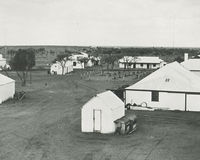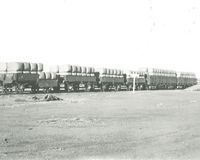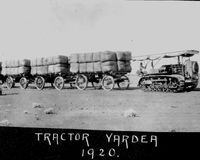Company History
Robert James Martin 'RJM' McBride arrived in Adelaide from Newry, Ireland aboard the Bucephalus in 1855 and immediately sought employment in the Burra region of South Australia and before long had extensive holdings of grazing land. RJM's seventh child, Albert James, was born in 1868 and he purchased his first property, Faraway Hill (now part of Braemar Station) in 1902.
In 1920, Albert, his wife Louisa, and his eldest son Philip formed the company AJ & PA McBride Ltd, owning four properties, 114,766 sheep and cattle, horses, camels and donkeys. From the very beginning family was at the core of the business with three of Philip's sisters also acquiring a share of the company. Today, all the shares are still held by the descendants and partners of AJ's eight children.
The fledgling company of AJ & PA McBride Ltd acquired additional property throughout the 1920s from Montague Farms in Pooraka near Adelaide through to property near Port Augusta. Most significantly though was the purchase of Wilgena station in 1924 which increased the size of the company by a multiple not seen again until 2018.
In 1928 whilst on a trip to South Africa, AJ McBride succumbed to influenza aged just 59 years. Philip McBride assumed the chairmanship and his younger brother Albert James II, known as Jim, joined the board.
Whilst the nation was recovering from the effects of the great depression, AJ & PA McBride continued to thrive, with the first purchase in the South East of the state. Previously this region was beset by heavy winter inundation and cobalt and other trace element deficiencies. The introduction of the South East drainage scheme and advances in superphosphate opened up the productive capacity of the region.
Philip McBride began his first stint in federal parliament in 1931, being elected to the United Australia Party in the outback division of Grey. Jim then took a greater involvement in the management of the firm
Tragedy struck the McBride family early in 1942 when Philip McBride's second son Keith was killed in active duty in Libya as part of the Air Force in the second world war. At the time, Philip was a senator for South Australia, Minister for Munitions, Supply and Development and a member of Robert Menzies' War Cabinet. Philip was defeated at the 1943 election and he then worked with Menzies to form the Liberal Party of Australia.
AJ & PA McBride purchased and sold the historic Burra mines during this decade and also purchased 'Yerda' a property on Kangaroo Island which would be held by the company until 1977.
The post-war 1950s were a boom time for Australian wool growers where wool reached 'a pound for a pound', more than $75/kg in today's money (by comparison, wool prices today are around $15/kg).
During this decade the company purchased the Brooklyn and Nepowie properties, along with the iconic Faraway House at 21 Franklin St in the Adelaide CBD.
Whilst Sir Philip McBride (knighted in 1953) commenced his second stint in Federal Parliament, this time for the division of Wakefield, Jim McBride managed the day to day operations of the company with assistance from his brothers-in-law Bert Swift and Ces Taylour.
Up until 1964, all of the company's holdings were within South Australia. This changed when 'Aroona' was purchased in Western Australia. Located 100km east of Esperance on the south coast of WA, Aroona was noted as having some of the cheapest cropping land in the country.
Also in the 1960s, AJ & PA McBride Pty Ltd became a proprietary company, reinforcing the family nature of the business.
Further south east property purchases were conducted in the 1970s, with Konetta station, at Greenways purchased in 1974 as well as the Omar block, doubling the size of Brooklyn station. In order to finance the purchases, Yerda station was sold on Kangaroo Island.
In 1978, after fifty years as chairman, Sir Philip McBride resigned from the role and his son, also Philip, assumed the position. Sir Philip remained a director, along with his son and grandson (both Philip), his nephew Michael McBride and his nephew-in-law Bob Collins.
The excesses of the 1980s extended into agriculture where the wool price, protected by reserve price scheme provided good returns over the decade. In 1984 the Wooltana property located near Copley in the state's far North was sold with part proceeds returned to shareholders and the reminder reinvested in the company. Blocks were purchased adjoining Aroona, Konetta, Braemar and Wilgena during the decade as well as the Coorong property "Woods Well".
Sir Philip McBride died in 1982, with his Brother Jim dying in 1989.
The decade of the 1990s was arguably the low point of wool growing in Australia's history. Government intervention in the pricing of wool, through the reserve price scheme resulted in an excess of supply and poor quality wool. When the reserve price scheme was removed in 1991 the price plunged and the industry was decimated. It is estimated that the wool industry lost $12 billion when the price scheme collapsed at a time when the nation was also in the grips of recession.
AJ & PA McBride struggled for the rest of the decade, although it continued to support the family through measured dividends. The death of Jim's second wife Mary in 1997 brought to a close the second generation of the family.
In order to diversify the company's income away from wool, the company purchased 'The Gap' station near Penola late in the decade for the purposes of increasing the company's beef herd. A proteacae plantation was also planted on Brooklyn Station.
The wool industry was still recovering from its collapse of the previous decade, with the government stock pile of wool only liquidated in 2001. The company spent the first half of the decade consolidating its holdings, selling The Gap and Woods Well, whilst purchasing blocks adjoining Braemar and Teetulpa. The company furthered its diversification, purchasing Faraway Vineyard and a share in the Pike Creek citrus orchard located at Lyrup in the Riverland.
Towards the end of the decade, the company embarked on a strategy towards excellence in its agricultural pursuits, restructuring the management to promote better intra-company benefits, utilising benchmarking of properties; and continuing genetic gains to produce high quality wool and meat.
As a response to the Global Financial Crisis and the issues with its remoteness, the Aroona property in Western Australia was sold in 2009. Also sold, was the company's head office in Franklin St, with the business moving to Wayville, on the city fringe near the showgrounds.
Following the sale of Aroona, the company added land to all the properties in the South East, most notably at Konetta station. The company also purchased two commercial properties in Adelaide. These properties were purchased to provide a hedge to agriculture, but also to provide a consistent income both from year to year, but also from month to month.
A significant purchase in 2013 was a minority shareholding in the Bleasdale Winery, the oldest winery in the Langhorne Creek region of South Australia. Following this was the purchase of Yudnapinna Station and then in 2018 the purchase of the 47,000 ha property at Telopea Downs in Victoria.
In 2015 the shareholders of the company voted to again become a public company, albeit still with closed family shareholding rules. This allows all 102 shareholders to have an enfranchised say in the company's affairs.
As the company approaches its centenary, the focus is again on wool. Our agricultural holdings, dedicated staff and passionate shareholders are geared to ensure that our family company remains strong, united and profitable.
With the commitment to wool strong, in 2020, the company made the decision to sell Faraway Vineyard. In the same year, Australia and the world was challenged with Covid-19. During this period, the importance of Australian agriculture and growing our own food and fibre was evident. While there were challenges to overcome, as an essential industry, we were able to continue our production with continued success.
In 2021, when the long term tenant ended their tenancy at 60 Greenhill Road, the board made the decision to sell the commercial property.
In 2022, the company purchased Konleigh Flat, a piece of agricultural land neighbouring Konetta, increasing the size of Konetta Station to 7732ha.
In February 2024, AJ & PA McBride purchased Keilira Station, a property well known to the company, after being held by the wider McBride family for over sixty years. Located between our Brooklyn and Ashmore properties, it was an ideal acquisition in which to continue our growth.





